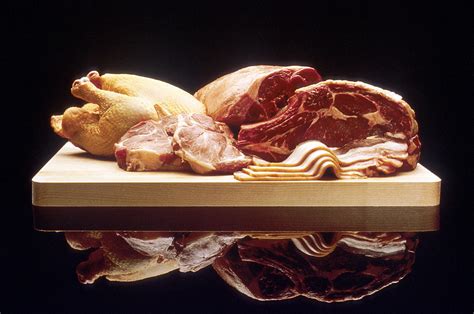(单词翻译:单击)
How we see meat
内脏美食:重口味的诱惑
US food author M.F.K. Fisher once wrote about humans, "First we eat, then we do everything else."
美国美食作家M·F·K·费希尔曾如此描写人类:“先吃饱了饭,才能去干别的事。”
This is why each year we celebrate World Food Day, which falls on Oct 16. But despite the importance of food around the world, food cultures often differ greatly from country to country. For example, things like chicken feet, duck heads, and pig brains are commonly eaten in Asia. If you asked most Westerners to try one of these things, though, the very thought would probably be enough to make them give up meat altogether.
这便是每年10月16日我们都会庆祝世界粮食日的原因。尽管食物在全球各地都至关重要,但国与国之间的饮食文化却大相径庭。比如,鸡爪、鸭头、猪脑等食物在亚洲很常见。但如果你要让大多数西方人尝试一下,估计他们一想到此,就足以改吃素食了。

At the same time, however, the majority of people in Western nations regard themselves as meat eaters. So, what could be the reason behind this double standard?
但与此同时,西方国家的大多数人都认为自己是肉食主义者。那么,是什么导致了这样的不同呢?
There are a number of possible answers to that question, yet one major reason could lie in recent cultural changes. During the mid 20th century and the years following it, eating most parts of an animal was common in many Western countries such as the UK – perhaps owing to rationing as a result of World War II (1939-1945).
这个问题或许有多种答案,但其中的一大原因或许是近代的文化变迁。在20世纪中期以及接下来的数年间,食用动物身体的大多数部位在英国等西方国家十分常见 ——这或许与二战期间的定量配给政策有关。
But later, during the 1960s and 70s, following the introduction of highways in the US and the UK, the popularity of supermarkets in those countries increased, wrote Francesco Burnett, author of Cultural History of Meat: 1900-The Present.
但后来,在上世纪60-70年代,随着英美等国建起了高速公路,超市在这些国家也普及开了,《肉类文化史:1900年至今》一书的作者弗朗西斯科·伯内特如此写道。
Thanks to the popularity and convenience of supermarkets, which tend not to sell animal parts such as the head or limbs, the public's attitude of meat soon shifted. "The 'animal' gradually disappeared from meat, and people's ignorance about what animal the meat they ate came from increased," Burnett added.
由于超市的普及和便利,很少售卖动物部位,如头、四肢等等,公众对于肉的态度很快也发生了变化。“‘动物'的概念慢慢地从“肉类”一词中消失了,人们开始日益忽略他们所吃的肉是哪些动物的,”伯内特补充道。
As a result, it's believed that many Western cultures slowly began to view meat as simply a food product, rather than as something that came from an animal.
因而人们认为,许多西方文化渐渐地只是将肉类视为一种食品,而非动物的一部分。
However, this theory may go even further back if we look at the words the English language uses to describe meat. "We 'de-animalize' certain foods that we eat by giving them different names," Hal Herzog, author of Why It's So Hard To Think Straight About Animals, told online magazine Grist. "We don't say it's cooked pig; we say it's pork. And we don't say hamburger is made of cow; we say it's made of beef."
但这种说法或许还能追溯回更早的时间,看看英文中用于形容肉类的词汇就知道了,“我们给一些食物起了不同的名字,消除了这些食物与动物的联系,”《为什么很难想到动物》一书的作者哈尔·赫尔佐格在接受线上杂志《Grist》采访时如此说道。“我们不会说煮熟的猪,而是说猪肉。我们不会说汉堡包由牛制成,而是说由牛肉制成。”
So it seems that there's not one simple answer to this question. When it comes to eating meat, however, perhaps we should simply just enjoy the taste.
所以,这个问题似乎没有一个简单的答案。而吃肉时,或许我们只需享受美味即可。


